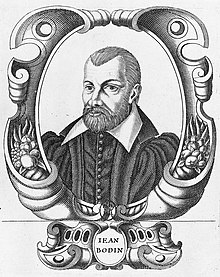
Back Jean Bodin Afrikaans جان بودان Arabic جان بودان ARZ Jan Boden Azerbaijani Жан Бадэн Byelorussian Жан Бадэн BE-X-OLD Жан Боден Bulgarian Jean Bodin BS Jean Bodin Catalan Jean Bodin Czech
Jean Bodin | |
|---|---|
 | |
| Born | c. 1530 Angers, Maine-et-Loire, France |
| Died | 1596 |
| Era | Renaissance philosophy |
| Region | Western philosophy |
| School | Mercantilism |
Main interests | Legal philosophy, political philosophy, economy |
Notable ideas | Quantity theory of money, absolute sovereignty |
| Part of the Politics series |
| Republicanism |
|---|
|
|
Jean Bodin (/boʊˈdæn/; French: [ʒɑ̃ bɔdɛ̃]; c. 1530 – 1596) was a French jurist and political philosopher, member of the Parlement of Paris and professor of law in Toulouse. Bodin lived during the aftermath of the Protestant Reformation and wrote against the background of religious conflict in France. He seemed to be a nominal Catholic throughout his life but was critical of papal authority over governments and there was evidence he may have converted to Protestantism during his time in Geneva.[1][2][3] Known for his theory of sovereignty, he favoured the strong central control of a national monarchy as an antidote to factional strife.
Towards the end of his life he wrote a dialogue among different religions, including representatives of Judaism, Islam and natural theology in which all agreed to coexist in concord, but was not published. He was also an influential writer on demonology,[4] as his later years were spent during the peak of the early modern witch trials.
- ^ Jean Bodin and the Sixteenth-century Revolution in the Methodology of Law and History. Columbia University Press. 1963. ISBN 978-0-231-91664-6.
- ^ The Theater of Nature: Jean Bodin and Renaissance Science. Princeton University Press. 14 March 2017. ISBN 9781400887507.
- ^ Ways of Lying: Dissimulation, Persecution, and Conformity in Early Modern Europe. Harvard University Press. 1990. ISBN 9780674948341.
- ^ James I (King of England) (1603). Daemonologie. Edinburgh 1597. A. Hatfield for R. Waldgrave.